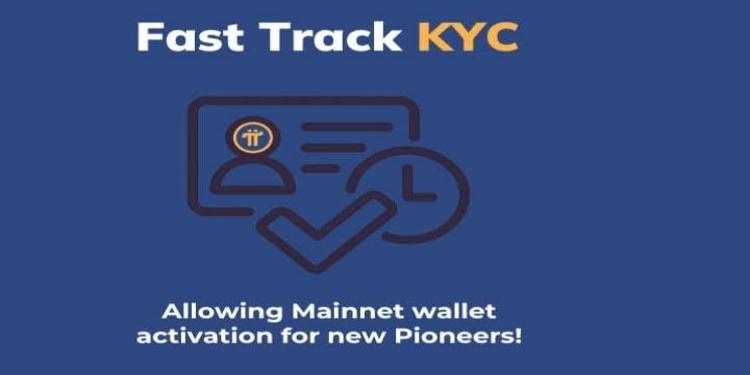Introduction: A New Chapter in Pi Network’s Growth
Pi Network has taken another significant step in its mission to create an accessible, utility-driven digital ecosystem. The launch of Fast Track KYC introduces a new pathway for identity verification that enables new Pioneers and even non-users to activate their Mainnet wallets earlier than before.
By integrating AI-driven KYC solutions directly into the Pi Wallet app, Pi is removing barriers that once delayed participation in the Mainnet ecosystem. While this update does not replace the standard KYC or Mainnet migration process, it represents a milestone in Pi’s vision to onboard verified, real users more quickly—while upholding strong compliance and security standards.
In this article, we’ll explore:
- What Fast Track KYC is and why it matters.
- How it changes wallet activation for new users.
- The benefits and limitations of this new pathway.
- Its impact on the future of Pi’s broader KYC ecosystem.
- Why this feature strengthens Pi’s long-term mission.
What Is Fast Track KYC?
Fast Track KYC is a new feature integrated into the Pi Wallet app that allows eligible users to verify their identity earlier than before. Unlike the traditional method—where new users had to complete at least 30 mining sessions before becoming eligible for KYC—Fast Track KYC removes this waiting period.
This means that new Pioneers, even those with fewer than 30 mining sessions, and even non-users can complete an early KYC process to activate their Mainnet wallet.
Once the process is completed successfully, verified users gain immediate access to a Pi Mainnet wallet, enabling them to:
- Store and manage Pi tokens in a verified wallet.
- Engage with Pi apps and local commerce.
- Participate in ecosystem events and testing.
Importantly, Fast Track KYC does not equal migration. Mined balances will only be migrated after a user completes the Mainnet Checklist and meets standard eligibility (including 30 mining sessions).
Why Pi Introduced Fast Track KYC
Pi Network’s mission has always been rooted in accessibility and trust. To achieve this, the network needs to ensure that its participants are real, verified individuals—not bots or duplicate accounts.
The traditional process worked well for scalability but had one downside: delays for new Pioneers. A new user who joined Pi had to mine for at least 30 days before they could even apply for KYC. This created a gap between initial onboarding and active ecosystem participation.
Fast Track KYC solves this by:
- Shortening the waiting time for wallet activation.
- Allowing more users to test and use apps earlier in their journey.
- Expanding the verified user base, which supports developers and merchants building on Pi.
- Reducing reliance on third-party providers like Banxa, since Pi now has its own native early-KYC solution.
How Fast Track KYC Works
Fast Track KYC is designed to be simple and user-friendly:
- Eligibility Check – Pioneers with fewer than 30 mining sessions (or even non-users) may see the Fast Track KYC option appear in their Pi Wallet app.
- KYC Process – Users go through the identity verification process, which is powered by Pi’s AI-based system.
- Wallet Activation – Once verified, the user’s Mainnet wallet is activated immediately.
- Participation in the Ecosystem – Users can now engage with apps, events, and commerce within Pi’s ecosystem.
This early wallet activation gives newcomers a taste of the network before migration, making the experience more engaging and reducing early drop-offs.
What Fast Track KYC Enables
Activating a Mainnet wallet via Fast Track KYC unlocks several opportunities for new users:
- Early Engagement with Pi Apps – New Pioneers can test decentralized apps, interact with services, and join ecosystem experiments.
- Participation in Local Commerce – Verified wallets open up possibilities for small-scale transactions and local trade.
- Access to Community Events – Some ecosystem activities require verified wallet access, which is now possible earlier.
However, there are clear limitations:
- No Migration Yet – Mined balances will not be transferred until users complete the full Mainnet Checklist, including standard KYC.
- Strict Standards Apply – Fast Track KYC does not lower verification standards. In fact, its automatic nature may result in more conservative evaluations, meaning some applicants could face rejections if their submissions don’t meet requirements.
- Not a Shortcut to Rewards – While it accelerates wallet access, it does not guarantee quicker earning or migration benefits.
The Importance of Strong Security in Fast Track KYC
One of the concerns with any identity verification process is maintaining security and accuracy. Pi Network emphasizes that Fast Track KYC does not compromise quality.
- Applications must still meet the same compliance requirements as traditional KYC.
- Fraudulent or incomplete submissions will be rejected.
- AI automation ensures faster processing but applies strict filters to maintain integrity.
This approach aligns with Pi’s vision of building a KYC-verified blockchain, which helps prevent abuse, ensures fair distribution, and builds trust with developers and users alike.
How This Benefits the Broader Ecosystem
By enabling earlier wallet activation, Pi Network achieves several ecosystem-wide advantages:
- Larger Verified Audience – Developers gain access to more verified users who can test apps and services.
- Faster Feedback Loops – Ecosystem apps can gather user data earlier, improving their design and functionality.
- Encouragement for New Users – Immediate access makes the onboarding process more exciting, reducing drop-offs.
- Strengthening Compliance – Verified wallets build a safer environment for commerce and integration with third-party services.
This benefits not just individual Pioneers but also the long-term health of the Pi economy.
Comparison: Fast Track KYC vs. Standard KYC
| Feature | Fast Track KYC | Standard KYC |
|---|---|---|
| Eligibility | New users with <30 mining sessions + non-users | Users with ≥30 mining sessions |
| Wallet Activation | Immediate after verification | After checklist + migration |
| Migration | Not included | Included |
| Standards | Strict, automated, may be conservative | Manual + automated |
| Purpose | Early engagement in ecosystem | Full participation and migration |
This comparison shows that Fast Track KYC is complementary, not a replacement. Both processes serve different stages of the user journey.
Future of KYC in Pi Network
Fast Track KYC is not the final step but a stepping stone. Pi’s team has indicated that this technology can later be integrated into the standard KYC process to make it faster and more efficient.
Possible future improvements include:
- Streamlining migration KYC to reduce waiting times.
- Reducing human validation workload by relying more on AI.
- Calibrating acceptance standards for different user regions and scenarios.
- Adapting for large-scale onboarding as Pi continues to grow globally.
Over time, Fast Track KYC may become a standard part of Pi’s overall verification infrastructure, balancing speed with accuracy.
Compliance and Industry Alignment
The Pi Network has long championed the importance of identity verification in blockchain ecosystems. Its early adoption of KYC contrasts with many other networks that often delay compliance until later stages.
Now, this strategy is gaining recognition across the industry. Emerging standards like ERC-3643, which embed identity and compliance logic directly into tokens, show that the industry is moving toward verified, permissioned participation models.
Pi’s decision to expand KYC options years earlier has positioned it ahead of the curve, and Fast Track KYC further reinforces this leadership.
Regional Expansion: KYC Now Available for Syrian Users
Alongside the launch of Fast Track KYC, Pi announced that KYC services are now available to eligible individuals located in Syria.
This change follows Executive Order 14312, which terminated the U.S. government’s Syria Sanctions Program. With this adjustment, Pi can extend its verification services in compliance with all applicable laws and regulations.
For Syrian users, this represents an important opportunity to join the verified Pi ecosystem and participate in its growing Mainnet activities.
Why This Matters: Strengthening the Network for Everyone
Fast Track KYC is more than a convenience—it strengthens the entire Pi Network by:
- Expanding participation to more real users.
- Supporting developers who need verified audiences.
- Accelerating ecosystem testing and adoption.
- Reinforcing compliance and security from the ground up.
By focusing on real people, verified participation, and accessible onboarding, Pi is building the foundations of a sustainable and utility-driven blockchain economy.
Conclusion
The launch of Fast Track KYC marks a milestone for Pi Network. By enabling new users to activate wallets earlier, Pi is lowering barriers to entry while maintaining strong verification standards.
Although Fast Track KYC does not replace standard KYC or guarantee migration, it creates a pathway for earlier engagement, benefiting both new Pioneers and the ecosystem at large.
As Pi continues to iterate and improve its verification systems, the broader vision becomes clearer: a blockchain powered by real, verified individuals who can participate safely and meaningfully.
With over 14.82 million migrated and KYC-verified people already on the Pi Mainnet blockchain, and millions more on the way, Fast Track KYC is another step toward Pi’s ultimate goal: a global, accessible, and utility-driven digital economy.


